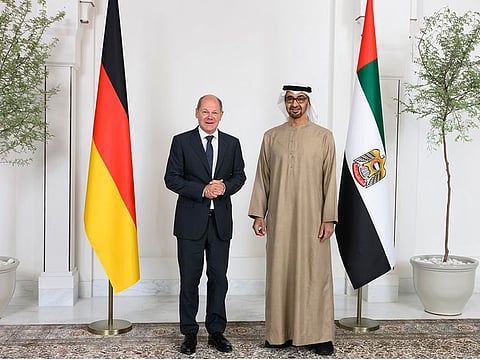Germany and the UAE forge a strategic partnership
In conversation with German Ambassador to the UAE, Alexander Schönfelder

Highlights
German Ambassador to the UAE, Alexander Schönfelder highlights milestones in diplomatic, economic, and cultural collaborations while addressing future opportunities for sustainable energy, education, and global challenges
How would you describe the evolution of diplomatic and economic relations between the UAE and Germany over the past decade, and what are the most significant milestones in this partnership?
Germany and the UAE share excellent diplomatic and economic relations that have flourished for over five decades. This year marks the 20th anniversary of the Strategic Partnership between our two countries. Numerous high-level visits from both Germany and the UAE underscore the strength of our relationship. German Chancellor Olaf Scholz and UAE President His Highness Shaikh Mohamed bin Zayed Al Nahyan have met several times in recent years, reaffirming their commitment to revitalising our partnership.
In the economic sphere, the UAE has become Germany’s largest trading partner in the region, with trade volumes growing significantly. This reflects a deepening economic interdependence, which is crucial for both nations.
A key milestone is the Emirati-German Energy Partnership, established in 2017, and later expanded into the Energy and Climate Partnership in 2022. Additionally, the Hydrogen Task Force, initiated in 2021, reflects our joint commitment to energy security and sustainability. In recent years, we’ve seen the first shipments of low-carbon ammonia and LNG to Germany, underlining the importance of our cooperation in these areas.
Our partnership extends beyond political and economic aspects, encompassing cultural exchange, university collaboration, tourism, and addressing global challenges such as climate change and sustainability.
In terms of trade, Germany has long been one of the UAE’s top trading partners in Europe. What sectors do you see as having the greatest potential for future growth in trade and investment?
Our trade relations are evolving positively. German products, especially in mechanical engineering, automotive, electrical goods, and chemicals, are well-regarded in the UAE. We see significant potential for further growth in sectors such as renewable energy, sustainability, artificial intelligence, technology, digitisation, smart manufacturing, and healthcare.
Investment relations are also strengthening. The UAE’s increasing interest in German markets is exemplified by Masdar’s co-investment in the Baltic Eagle offshore wind farm and several other notable initiatives. This not only enhances economic ties but also underscores a shared commitment to sustainable energy development.
Sustainability is a major focus for both the UAE and Germany, particularly with the UAE hosting COP28 this year. Could you highlight some of the most impactful collaborations in renewable energy and green technology between the two nations?
The UAE and Germany are pioneers in sustainability. Through our bilateral climate and energy partnership, we have implemented significant projects, especially in hydrogen. For instance, Fraunhofer ISE, a German research institute, helped draft the UAE’s first hydrogen strategy, which was published in 2023.
ADNOC also sent a test shipment of low-carbon ammonia to Germany in 2022. We are currently working on establishing a hydrogen value chain between our countries, including production facilities and logistics, positioning the UAE as a key partner and supplier for Germany.
To facilitate knowledge exchange, both countries regularly hold bilateral Climate and Energy Days, conduct exchange trips, and implement joint projects in a range of sustainability-focused fields.
Cultural exchange is an important element of any bilateral relationship. Could you speak to some of the initiatives or programs that have strengthened people-to-people ties between the two countries?
Cultural ties have been a cornerstone of our cooperation. We believe that fostering strong people-to-people connections, particularly among the youth, will shape the future of our bilateral relationship.
There are three international German schools in the UAE, located in Abu Dhabi, Dubai, and Sharjah, with around 1,500 students, including an increasing number of Emirati students. This year, the first German university, the University of Europe (UE), opened its doors in Dubai, offering top-quality German education in fields such as digitization, software engineering, business, and management.
Germany’s focus on vocational training is often regarded as a model worldwide. How is this expertise being shared with the UAE, particularly in preparing Emiratis for careers in advanced sectors?
Germany’s dual vocational training system is highly regarded and one of our most successful exports. We are happy to support the UAE in promoting vocational education and training.
German organisations like GIZ IS and German companies have implemented programs to train young Emiratis for private sector careers. Recently, GIZ IS has managed two Technology and Career Centers, adding vocational preparation to school curricula.
Beyond vocational training, German institutions like AHK and the German-Emirati Institute conduct initiatives to support Emirati students and graduates, such as mentoring programs and internships with leading German companies.
Given the geopolitical importance of both the UAE and Germany in their respective regions, how do the two nations collaborate on international issues like peace, security, and humanitarian efforts?
Germany and the UAE are close strategic partners, maintaining constant dialogue on international issues. Both nations prioritise humanitarian aid, particularly in Gaza, where both Germany and the UAE are among the top donors. Recently, Germany increased its humanitarian aid for Gaza and supported the UN’s vaccination program against polio.
Looking ahead, what are the key priorities for deepening the UAE-Germany partnership, particularly in light of global challenges like climate change and economic transformation?
We aim to continue and deepen our trusted partnership in areas of mutual interest, including political and economic cooperation, energy, climate, and cultural exchange. Our strategic partnership and the initiatives we’ve developed over the years equip us to address both current and future challenges.



